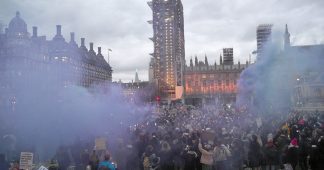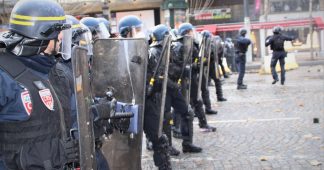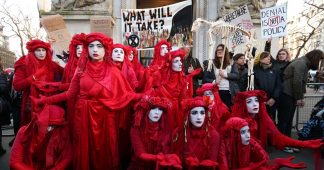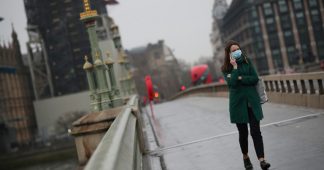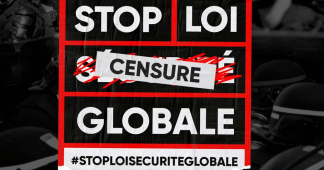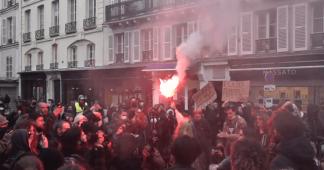By Thomas Scripps
Boris Johnson’s Conservative UK government is rushing the Police, Crime Sentencing and Courts Bill through Parliament. The legislation prepares a massive crackdown on the right to protest.
Under the new anti-democratic laws, which update the Public Order Act of 1986, the police are empowered to place the same restrictions on static “public assemblies” as they currently can on moving “public processions”. These include restrictions on the location and start and finish times of protests, and the noise being made by protestors.
The laws governing the restriction of noise are expanded to include “where police reasonably believe the noise generated by persons taking part may have a significant detrimental impact on persons in the vicinity or cause a serious disruption to the running of an organisation,” according to the bill’s explanatory notes.
In case these definitions are not broad enough for the police’s purposes, the home secretary is empowered to decide what constitutes “serious disruption to the activities of an organisation which are carried on in the vicinity of a public procession” or “serious disruption to the life of the community” and restrict protests accordingly.
An entire section of the Bill is dedicated to “allow[ing] the police to impose conditions on one-person protests”. In Kafkaesque fashion, the bill states that, in the case of a one-person demonstration, a senior police officer may lay down “conditions as to the route of the protest”.
Where protestors are found guilty of violating these laws, they face a fine of up to £2,500. Anyone who organises a protest deemed illegal or who “incites” others to participate in it can receive a fine of £2,500, or a year in prison.
The Bill makes obtaining convictions significantly easier. The police no longer need to prove that a protestor “knowingly failed to comply with a condition”. A person is guilty if, “at the time the person fails to comply with the condition the person knows or ought to know that the condition has been imposed [emphasis added].”
Even more serious punishments are set out for those found guilty of “Intentionally or recklessly causing a public nuisance”, which can include an act which “obstructs the public or a section of the public in the exercise or enjoyment of a right that may be exercised or enjoyed by the public at large”. The punishment for such a broadly defined act is up to 10 years in prison.
Damaging memorials, including everything from statues to trees, also carries a potential 10-year sentence.
The Bill adds to the “Spy Cops” legislation, the Covert Human Intelligence Sources (Criminal Conduct) Act, enacted on March 1. The Act authorises “conduct by officials and agents of the security and intelligence services, law enforcement, and certain other public authorities, which would otherwise constitute criminality,” including serious crimes. Signalling the judiciary’s willingness to enforce these anti-democratic laws, the Court of Appeal ruled on March 9 that MI5 is legally allowed to authorise its agents to commit serious crimes.
The Covert Human Intelligence Sources Act was passed with only 34 Labour MPs voting against. Labour leader Sir Keir Starmer also intended to whip the party to abstain on the Police Bill, only switching to oppose it in the wake of the police attack on a vigil for Sarah Everard—murdered two weeks ago, with a Metropolitan police officer due to stand trial for her killing—sure in the knowledge that the legislation will pass anyway.
These draconian measures are aimed squarely at the working class and the political left. The sections of the Bill dealing with protests are based heavily on a review commissioned by Home Secretary Priti Patel last September. Patel asked the Inspectorate of Constabulary and Fire and Rescue Services to find ways of making permanent the severe restrictions on protests implemented under emergency coronavirus legislation.
The review, “Getting the balance right?”, concludes that the balance tips “too readily in favour of protestors” because police “do not accurately assess the level of disruption caused, or likely to be caused, by a protest.” A long section is titled “Businesses and the private sector”. It states that the police “do not consistently assess the impact protests have on businesses” and suggests they “consider both the direct and indirect impact on businesses when deciding how to balance protesters’ rights with the rights of others.” The word business is mentioned 16 times throughout the report and the word businesses 42 times.
The review calls for an improvement in “the quality of police intelligence on protests, particularly intelligence about those who seek to bring about political or social change,” in an allegedly “unlawful” way. “This may sometimes involve covert sensitive intelligence-gathering methods, which include surveillance and the use of CHISs [covert human intelligence sources]”—undercover officers and spies.
Patel’s review and the Police Bill are a response to mounting social tensions, escalated by the pandemic crisis. The legislation was first conceived in response to the Extinction Rebellion protests of 2019 but was pursued with increased urgency after the international George Floyd protests last summer—which the ruling class recognised as anticipating a far broader eruption of the class struggle.
Now that this process is beginning to unfold in a wave of strikes across the UK, the government is stepping up its agenda. Its police-state response is indicated by the break-up of a small protest of NHS workers in Manchester on March 7, and the £10,000 fine of its organiser. On Wednesday, a picket of SAICA Packaging workers in Edinburgh was dispersed by police.
The license being given to police was summed up by the violent attack on the Everard vigil. Government ministers were forced to show “concern” for the scenes, but a Telegraph editorial cut to the chase. Noting that police have been “empowered to clamp down on peaceful gatherings”, the editorial insisted that “the means to enforce them must be provided. That includes supporting the police when they are criticised for breaking up the meetings.”
Every government in the world is pursuing the same strategy, strengthening the police in preparation for confrontations with the working class during a crisis which has led to millions of deaths, job cuts and trillions in lost wages, while the billionaires have seen their fortunes rocket. In just the last week, police forces in Greece and South Africa have cracked down brutally on student protests, using batons and rubber bullets. An explosion of police violence was unleashed across the America last year in response to peaceful George Floyd protests.
Countering the turn to dictatorial forms of rule demands the rejection of the reactionary politics of identity which portrays the violence of the state as the product of endemic racism and/or misogyny. The claim was made by Black Lives Matter during the George Floyd protests that police violence is the result of “white privilege”. With the murder of Everard, feminist groups have identified “the patriarchy” as the cause.
That large sections of the police are racist and misogynist is hardly a revelation. But this is an aspect of their essential class function, which is to violently suppress opposition to the capitalist state and the major corporations, and to terrorise working class neighbourhoods. The police must recruit from among the most backward and prejudiced layers of the population to fulfil these roles.
By holding “toxic masculinity”, “institutionalised misogyny” or “male privilege” responsible, identity politics—propounded by an affluent middle-class layer deeply hostile to the working class and entirely comfortable with its suppression—obscures the irreformable class function of the police and divides workers against themselves, in this case along gender lines.
It also lays the ground for an increase in the powers of the state in the name of protecting women. On Wednesday, Green Party member Baroness Jones of Moulescoomb suggested to the House of Lords “an amendment to create a curfew for men on the streets after 6pm. I feel this would make women a lot safer, and discrimination of all kinds would be lessened.”
The Financial Times wrote that “Curbing violence against women” could be aided by the Police Bill which “provides an opportunity for reform, though it needs amendment.”
Johnson has grabbed the opportunity with both hands, promising “greater use of CCTV” and to expand Project Vigilant, a strategy pioneered by Thames Valley Police which places undercover police officers in pubs, clubs and bars.
The bankruptcy of this politics was summed up by the comments of Anna Birley, representing feminist group Reclaim These Streets, to ITV’s Good Morning Britain in the aftermath of the police attack on the Sarah Everard vigil in Clapham. Birley opposed calls for Metropolitan Police chief Dame Cressida Dick to resign, explaining, “We are a movement of women seeking to support and empower other women, and as one of the most senior women in British policing history, we do not want to add to the pile-on.”
Dick first came to national prominence when she led the operation which resulted in the cold-blooded police murder of Jean Charles de Menezes in 2005. She organised a wave of over 1,000 arrests of climate change protestors last April. By Birley’s logic, not only Dick but Patel, the architect of the Police Bill, is also off-limits.
Not a single step can be taken in opposition to the government’s authoritarian agenda along these lines. The struggle against police repression and violence is not a sectional issue to be fought out by separate identities, or even a coalition of separate identities, seeking reforms of “police culture”. It is a class conflict between the capitalist state, which is clear on its objectives, and the entire working class.
Workers and youth have already made their hostility to the Police Bill and Johnson’s government clear. To defeat this assault requires a socialist programme and leadership that defends democratic rights through the mobilisation of workers internationally, on the basis of their common class interests, against their increasingly dictatorial governments
Published at www.wsws.org
